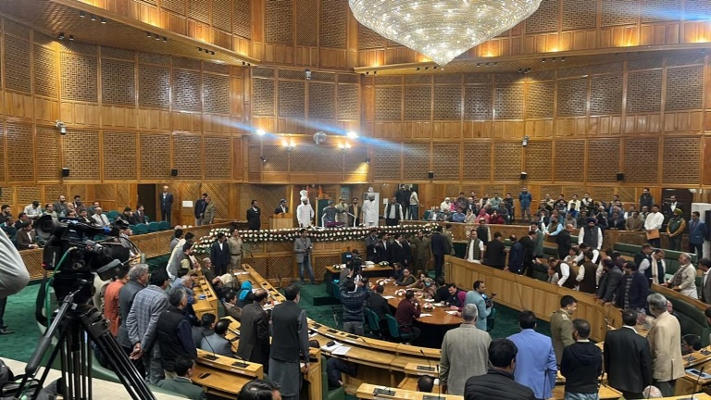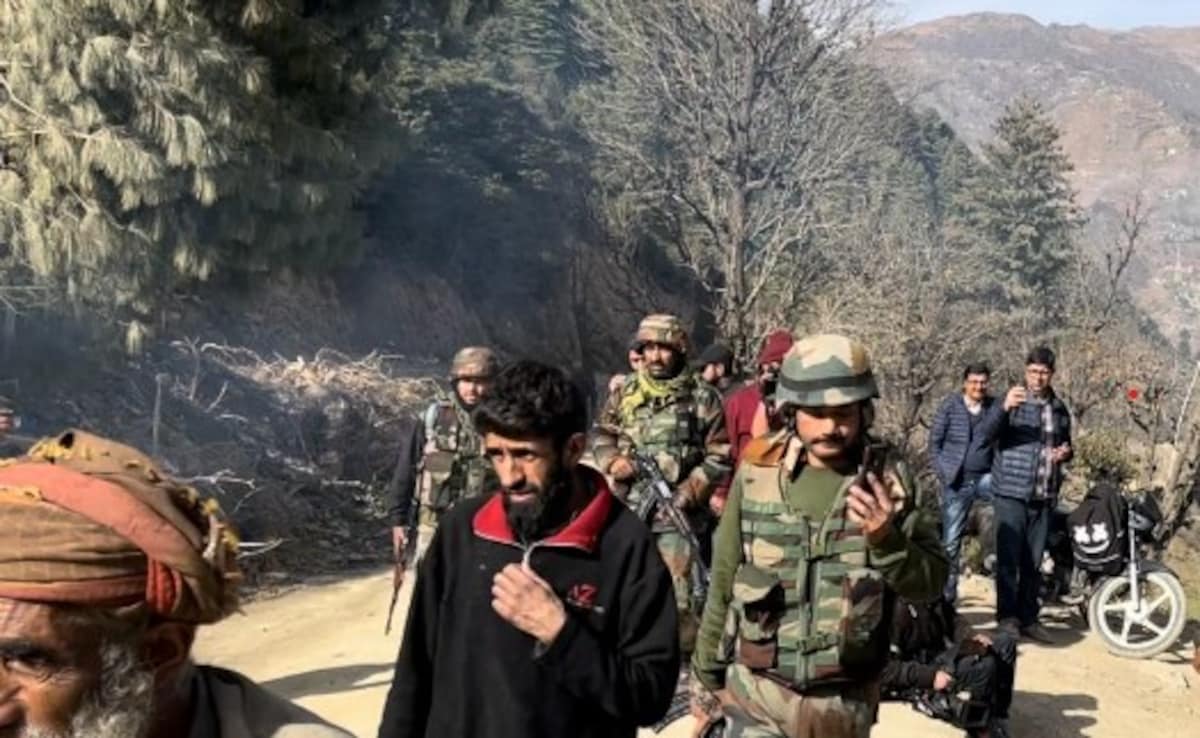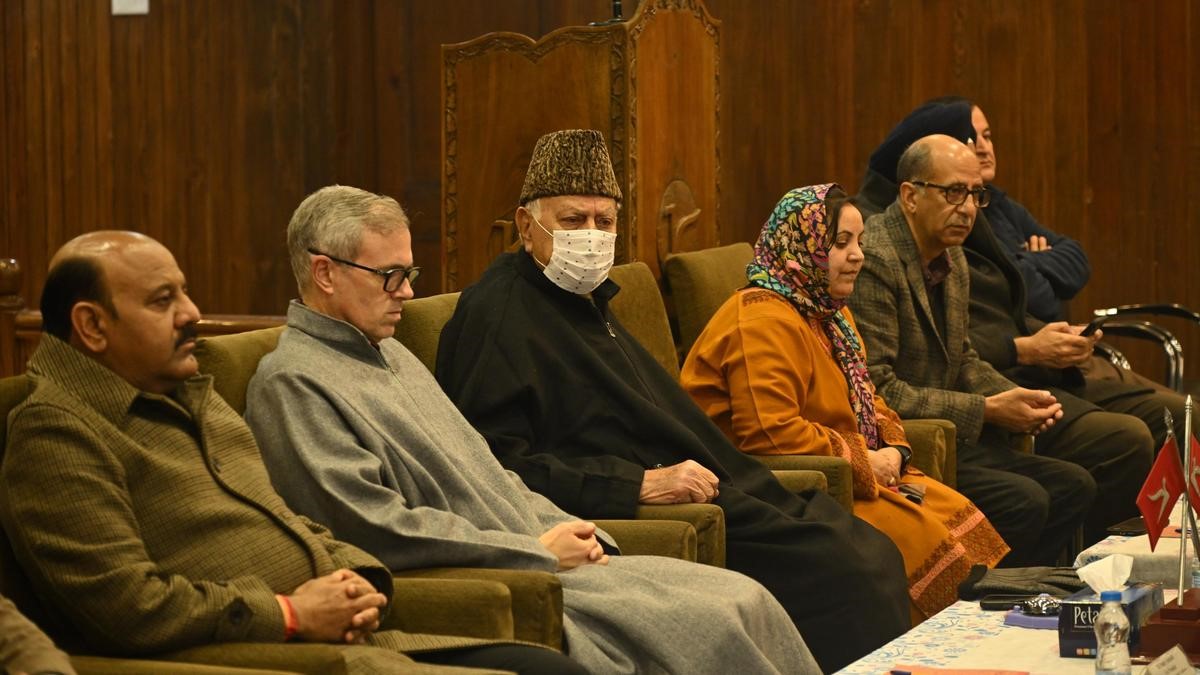Budgam National Law University Announcement & Poll Code Complaint – J&K Politics 2025
By: Javid Amin | 29 October 2025
What Was Announced?
During the autumn session of the legislative assembly of Jammu & Kashmir, Omar Abdullah made a formal statement in response to a resolution moved by Congress MLA Nizam‑ud‑Din Bhat (seeking establishment of the NLU in Srinagar).
Here are the key points of the announcement:
-
The NLU will begin functioning from April next year, albeit from a temporary/rented accommodation, rather than a permanent campus, to expedite start of classes.
-
A site has been identified in Ompora (in Budgam district, central Kashmir) — specifically a vacant campus originally meant for a software technology park — as a potential temporary location. Omar said: “If everything goes well, by April next fiscal we should be able to start classes in rented accommodation … that place [Ompora]”.
-
He clarified the permanent campus location will be finalised later (after discussion with the Chief Justice, UT’s Chief Secretary etc.) but emphasised the urgency to begin because students from J&K currently “have to go outside” for law studies.
-
The resolution demanding the NLU in Srinagar was passed via voice vote with no objection from the BJP in that house sitting.
So essentially: the government is signalling that the NLU will be operational (at least temporarily) soon, and Budgam (Ompora) is in the frame.
Why the BJP Says It’s a Poll Code Violation
The announcement triggered an immediate reaction from the Bharatiya Janata Party (BJP) in J&K, particularly because a by-poll is due in the Budgam Assembly constituency (with the MCC in force). The BJP alleges the announcement amounts to an inducement or promise of benefit targeted at the electorate of Budgam.
Key details of the complaint:
-
The BJP’s candidate for the Budgam by-poll, Aga Syed Mohsin, lodged a formal complaint with the Election Commission of India (ECI) saying the CM’s statement “is being widely circulated across media and social networks and is clearly intended to influence the electorate of Budgam by creating a perception of imminent institutional and developmental benefit in the constituency.”
-
The complaint argues that such announcements, especially when a by-election is nearing (Budgam polling scheduled for 11 November 2025), fall foul of MCC guidelines and possibly section 123(2) of the RPA, 1951 (which deals with offering inducement to voters).
-
BJP leaders demanded Omar Abdullah resign on moral grounds for allegedly breaching the Code.
-
The BJP also argues that the announcement was made on the floor of the Assembly, which gives it an “official” colour and potentially institutional advantage (vs ordinary party campaign).
Political & Electoral Context
01. The Budgam By-Poll
The Budgam Assembly seat is vacant and a by-election has been scheduled (11 November 2025) under MCC. The announcement being directly linked to Budgam (in Budgam district) draws attention.
02. Strategic Importance of Education Infrastructure
Announcements of institutes like an NLU carry symbolic and developmental weight: such institutions can generate jobs, ancillary service demand, prestige and infrastructure investment in the host area. Setting it in Budgam would be a visible “win” for that constituency.
03. Location Politics
While the resolution mentioned placing the NLU in Srinagar, the CM’s announcement gave prominence to Budgam’s Ompora site. That shift adds to the political sensitivity: selecting a location becomes a matter not just of logic/academics but of electoral optics.
04. Governance & Timing
The timing is crucial: an announcement during an election window (MCC in force) and in a constituency going to polls raises questions from the opposition about fairness, impartiality and the possible use of governance announcements for electoral advantage. The government’s side argues that it is merely announcing policy/institutional decisions — but opponents counter that when targeted to a constituency and timed just before polls, the line is blurred.
Government’s Position & Defence
From available reports the government (via CM Omar Abdullah) has made the following points:
-
They emphasise that no final decision on which campus or precise site has been taken; the Ompora site is a potential temporary location, not a guarantee.
-
The intent is to start admissions and classes next academic session in “rented accommodations” to avoid delay in students’ opportunities.
-
The resolution in the Assembly had asked for the NLU; the government is responding accordingly.
-
The CM also said he will not go into the exact location debate during the speech: “Wherever it will be, it will be established in J&K.”
Thus the defence is: this is foundational infrastructure and not a targeted electoral promise — but the opposition remains unconvinced given timing and constituency-specific reference.
Key Questions & Implications
01. Is this really a Model Code of Conduct breach?
The MCC prohibits new government advertisements, announcements of projects or benefits that could influence voters during an election period. The BJP’s complaint rests on this premise: that the announcement was timed and targeted to Budgam, thus giving the incumbent an advantage.
However, there are legal and procedural nuances:
-
Announcements made in the legislative assembly sometimes get protection under parliamentary privilege — though their electoral effect can still be challenged. (See commentary from Republic World)
-
The proof of “electoral purpose” and “benefit targeted to constituency” will matter in any ECI inquiry.
-
The government may argue that the decision is administrative/policy and not constituency-specific in intent (even if the site is in Budgam).
02. What happens next?
-
The ECI/Chief Electoral Officer (UT) may examine the complaint, potentially issue a show-cause notice to CM Omar Abdullah.
-
If found guilty of MCC violation, it could lead to censure, directive to desist further announcements, and potentially impact the party’s credibility in the by-poll.
-
For Budgam voters and local political actors, this becomes an issue of “who gets the institute” and “who promised what and when”.
03. Longer-Term Implications
-
If the NLU indeed starts in Budgam (even temporarily), the constituency may see infrastructure investments and local economic activity — which in turn may shift political dynamics.
-
Educational infrastructure becomes a lever of electoral politics: announcing such institutions before elections may increasingly become an instrument of campaigning rather than purely policy.
-
The controversy may signal broader tensions in J&K between governance decisions, regional equity (Srinagar vs Budgam vs other districts) and election-timing.
04. What-if a different location is finally chosen?
If the permanent campus ends up being elsewhere (say closer to Srinagar) and Budgam only hosts a temporary facility (or none at all), the early announcement may provoke resentment among voters in Budgam or sharpen opposition rhetoric: “promised and delayed”. That risk may shape how the government handles follow-through and clarity of details.
Why It Matters for Jammu & Kashmir
-
Education infrastructure: For J&K, the establishment of an NLU is a high-profile boost to higher education, legal studies and associated services. Starting sooner would benefit local students.
-
Regional development & equity: Site selection is politically sensitive — Budgam vs Srinagar vs other districts evokes questions of fairness, access, centrality.
-
Electoral governance: The episode is a live case of the tension between governance announcements and elections in a region with active by-polls. It highlights how development decisions and election strategy increasingly intersect.
-
Politics of timing: With Budgam by-poll looming, announcements of big infrastructure at this juncture automatically take on electoral colour. For voters, such announcements might appear as vote-inducement promises rather than neutral policy.
-
Precedent for future: How this complaint is handled will send signals for future governance-by-announcement patterns in J&K (and India broadly).
Ground Reaction & Stakeholder Voices
-
BJP’s LoP in J&K, Sunil Sharma, accused Omar Abdullah of violating the MCC and demanded his resignation on moral grounds.
-
The BJP complaint states the CM’s announcement “amounts to a promise of benefit to electors, made by a political leader of high stature, thereby attracting the definition of corrupt practice under Section 123(2) of the RPA, 1951.”
-
On the other side, government sources emphasise the policy-nature of the decision and the urgency of starting the NLU to meet student needs. (See MoneyControl article)
-
Local media note that the Ompora site was originally identified for a software technology park (which the Air Force objected to) — so the site is available but not fully utilised.
My Take: Balanced View & What to Watch
As a socio-business editor analysing this scenario, here are my thoughts:
-
The decision to start classes early from a rented site is laudable from a student-access standpoint — it shows urgency, not waiting for full campus build.
-
However, the timing of the announcement (just ahead of by-poll in the specific constituency), and its location-specific mention (Budgam’s Ompora) necessarily give it an electoral dimension. Whether that crosses the legal threshold of MCC violation will depend on ECI’s scrutiny.
-
The government should ideally ensure: transparent timeline, clear criteria for location decision, ensure that Budgam (or whichever site) genuinely benefits (not symbolic promise), and maintain fairness in utilisation of state resources.
-
For the opposition, raising the complaint is legitimate — but they must also engage on policy substance (what is the timeline, how many seats will start, how will it be managed) rather than purely electoral optics.
-
For J&K citizens, this episode underscores the importance of: holding promises accountable, understanding how infrastructure commitments link with political campaigning, and demanding clarity on when the NLU will genuinely serve students across the territory (not just one constituency).
What to watch next:
-
Whether the ECI takes notice, issues any directive or show-cause to the CM.
-
The official notification of admissions or classes for the NLU from April next year – whether truly in Budgam (or elsewhere) and how it is communicated.
-
The permanent campus site decision – whether it remains Budgam, shifts to Srinagar or elsewhere, and how the decision-process is explained.
-
How local Budgam voters respond in the by-poll: whether the announcement influences votes, how it plays in campaign messaging for all parties.
-
Whether the government uses development announcements differently in the run-up to future elections, now under scrutiny.
Bottom-Line
The announcement by Omar Abdullah that the National Law University would begin classes in Budgam’s Ompora from April next year marks a potentially positive step for higher education in Jammu & Kashmir. But simultaneously, the political context — an impending by-poll and Model Code of Conduct in force — casts the decision into the realm of electoral strategy.
This is a moment where policy, politics and governance intersect. For the region’s students and educational infrastructure, the university is a welcome prospect. For democratic process and electoral fairness, the implications of how, when and where the announcement was made are significant.
Ultimately, if the NLU truly benefits the students and the constituency (rather than being just a campaign-promise), then this episode will be remembered for infrastructure delivery. If delays mount, or questions of fairness linger, it may be seen as a cautionary lesson in election-time governance.



